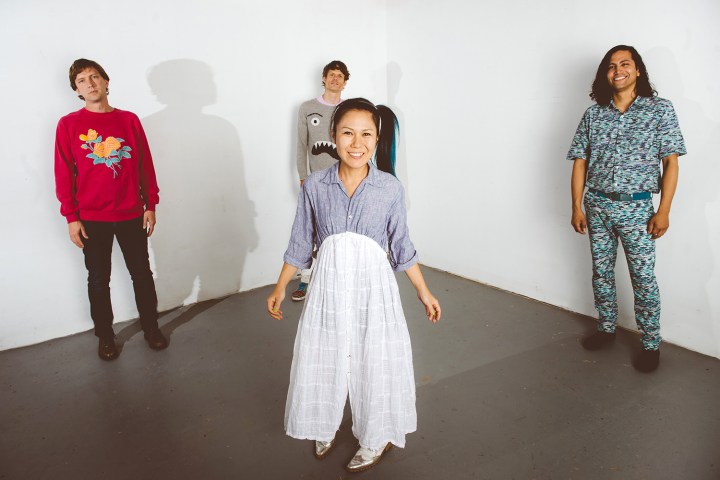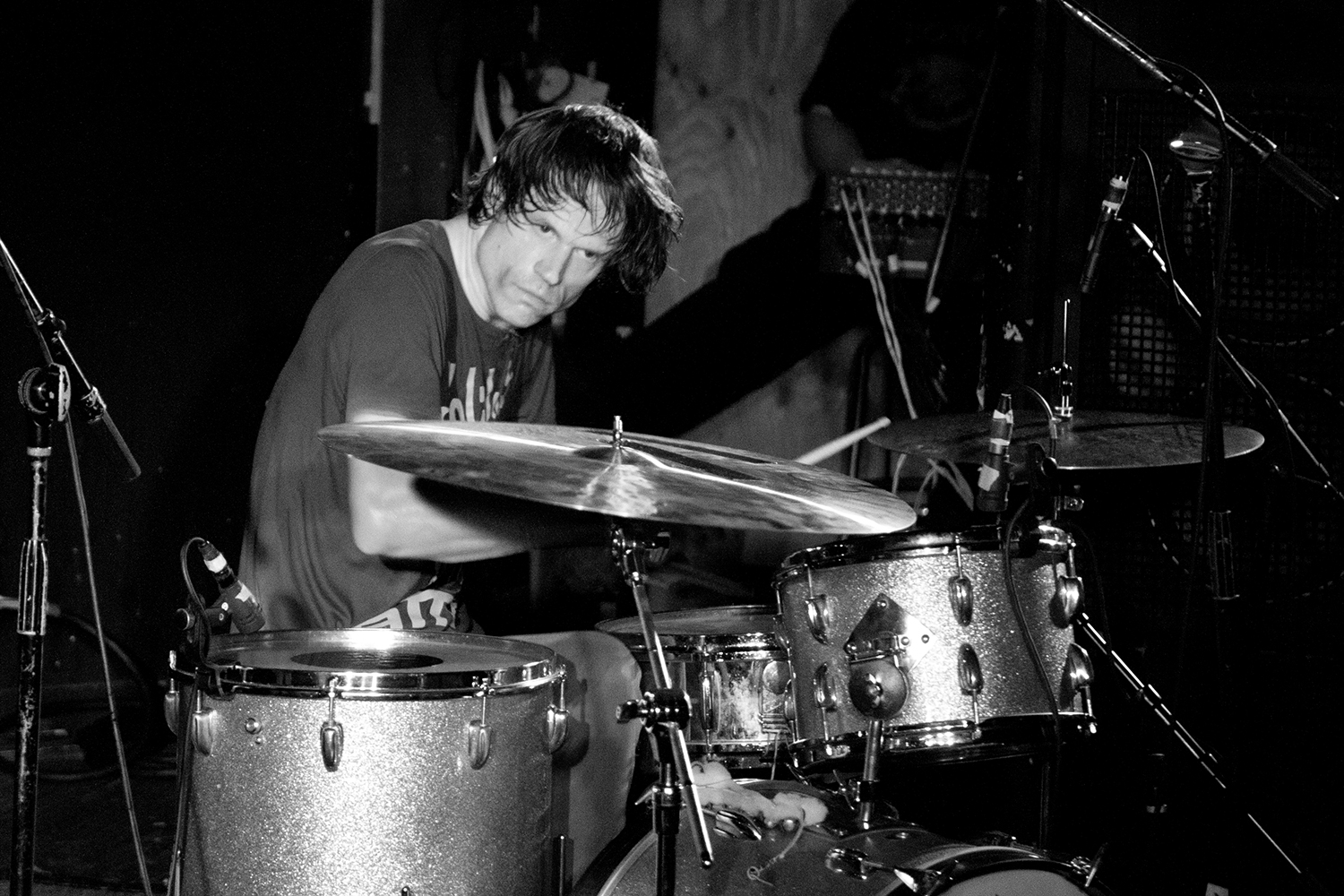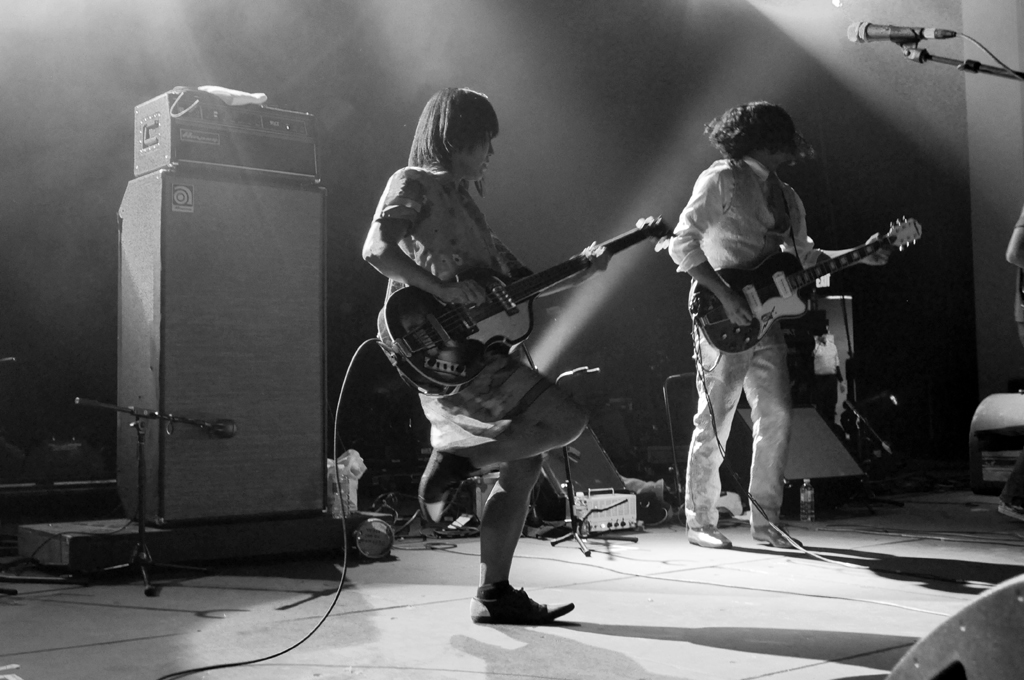
“Profound listening experiences can come anywhere.”
If ever there was a band that took the idea of marching to the beat of a different drummer to the next level, it would have to be Deerhoof. The always beyond-left-of-center alt-rockers recorded their lucky thirteenth studio album The Magic — out now in various formats via Polyvinyl — in an office complex of sorts in the New Mexico desert. In fact, The Magic could easily be the soundtrack for a Jesse Pinkman nightmare sequence on Breaking Bad.
“For this record, it was more of trying to make a mix that feels logical — which, for us, can mean something different from one song to the next,” Deerhoof guitarist John Dieterich told Digital Trends. “If we don’t have a lot of time, we’ll approach a song section by section while we’re recording. It’ll be, ‘OK, what’s the arrangement for this section? What is it for the next one?’ We approach it in a modular way. We have a general idea about the form, and then it gets tweaked over time.”
The Magic is a smorgasbord of sonic delights and aural challenges galore, from the distorted yet uplifting burbling bass on the deliberately contradictory Life Is Suffering to the off-kilter beats and oscillating vocals of I Don’t Want to Set the World on Fire (a song that literally sounds like it’s melting), while Model Behavior comes across like King Crimson in reverse after being stunned repeatedly by a death ray. Meanwhile, the frenzied rush of Nurse Me just might make you jump the next time you hear the word “x-ray.”
Dieterich called Digital Trends during a break from producing a friend’s album in upstate New York to discuss the sonic magic of The Magic, vinyl and streaming, and the key to the transformative power of music.
Digital Trends: I’ve really been enjoying the broad scope of The Magic. It feels like you’re taking advantage of the stereo field in many ways here, since there are a lot of things hard-panned to each channel.
John Dieterich: Sometimes we have a clear idea about that question. On one of our older records, The Runners Four (2005), we intentionally created a stereo field that was consistent throughout the record — and it was also wide. But that was intentionally set up to be a picture of what we’re doing — as in, you could picture where the band was positioned and consistently follow that throughout the record. Satomi [Matsuzaki, bassist/vocalist] is always far left on the record, for example.
And you recorded in an abandoned office in Albuquerque, is that right?
Ultimately, whatever method you choose, I just want you to hear our music.
(laughs) Actually, it’s not exactly abandoned. It’s an office building my friend’s dad owns. Basically, it’s three floors, and apparently, it used to be some sort of bunker. It’s incredibly well insulated with huge concrete slabs between floors, so there’s almost no bleed.
The first floor has offices they rent out, the second floor was empty while we were there, and the third floor was us and a swing-dance group that would get together on certain days after 6 p.m. So we knew we had to be done with tracking by then, because otherwise, it would have been a very swinging album. (both laugh)
I’d like to see how they’d dance to Nurse Me. (Dieterich laughs) A lot of times, it sounds like you’re on the edge of pushing distortion on a number of tracks, which I think is an interesting choice.
Generally speaking, if there’s distortion, it’s intentional. Especially with the guitars — most of the guitar sounds you hear were the sounds that we got at the amp. We had these tiny amplifiers that wouldn’t go up too loud, and we would just turn them up all the way. I got some really insane sounds from those little things. Usually, it’s just us trying to communicate what we think the mood of the song is.
I’m glad to see we’re getting a high-grade vinyl version of The Magic. Are you encouraged by the vinyl revival?
It’s great if people listen to it that way. I think the nice thing about vinyl is it’s a large canvas, in terms of a physical object. It’s fun to hold and you can have different colors, and stuff like that.
For me personally, I’m traveling a lot of the time, and if somebody gives me a record, I’m like, “Cool! I’m excited to hear it!” But I’m also like, “Oh — I have to get this home three weeks from now, and I’ll be lugging this in the van along with the four other people and all of our gear.”
I do enjoy listening to vinyl, but my needle went bad three years ago, and I still haven’t replaced it — simply because certain older records still sound fine on it! I have an old Toots and The Maytals record, Funky Kingston (1973), which is one of my favorites. I put that record on, and it sounds incredible with this completely destroyed needle. But if I put on any modern music, it just sounds like total garbage.
I think it’s because that Funky Kingston record probably wasn’t mastered hot — it’s kind of quiet and not full frequency, so it doesn’t have much information below 100 Hz, and nothing above 10k. And it just sounds wonderful.
You actually have the perfect lo-fi playback device for a ’70s record like that.
Exactly. It sounds like it’s supposed to sound; it doesn’t sound “wrong” at all. And there’s no distortion. If I get a test pressing of something, I check it on that stereo. Even though I know it’s destroyed, I put it on anyway just to compare it to the WAV version. But from here on out on that turntable, I’m only listening to Funky Kingston.
I’m hesitant to recommend a replacement needle to you, because it might make that record sound too clean, or something.
Right. It would probably sound too dynamic.
Since we’re in the streaming universe these days, how do you feel about people listening to your music that way? Is that cool with you?
Yeah, totally. Whatever method is available is fine. It’s whatever gets it into people’s ears. That’s how I listen to music most of the time too. Unfortunately, when I do, it’s usually when I’m doing something else — like when I’m driving or when I’m cooking.
Usually, the sound is just us trying to communicate what we think the mood of the song is.
But when I do have the time to listen, I have a good stereo system with nice speakers. It’s exciting and fun to listen to music that way. It’s like theater — it becomes a much more encompassing experience. And it is fun. It’s the difference between watching a movie on a little screen on your computer, or going into your local independent theater and getting to see it really big.
The fact that those experiences are unusual for me also makes them really special. Ultimately, whatever method you choose, I just want you to hear our music, whether it’s the lowest-grade MP3 or the highest possible fidelity.
I do what I call “appointment listening” at home. If you set up special listening occasions at home, you value them more.
And that’s the takeaway from this, isn’t it? When all of our media is filtered through the same device, and all of our work and all of our pleasure are also on the same device, it’s easy to do everything half-assed all of the time. Sometimes I’m like that and I know it’s not a great thing to do, but it’s also hard to get away from.
Since you’re officially our man in Albuquerque, will we be seeing you on an episode of Better Call Saul in the future?
(chuckles) You know what? I actually do know a lot of people who worked on Breaking Bad and Better Call Saul. Anyone I’ve talked to say that crew is the best. They’ve given a lot back to the community and raised the profile of Albuquerque.

But it’s this double-edged sword. We’ll do a show in France and someone will go, “Albuquerque is Breaking Bad! Is it really like that there? Is everyone you know a meth dealer?” Well, nahhhh… (both laugh)
Is there one record from your early days that still sticks with you?
From my childhood? (slight pause) OK, I’ve got a story for you. My first record was Flash Gordon.
You mean the soundtrack done by Queen for that 1980 movie?
Yeah! I just loved that movie. I loved everything about it. My whole family went to the record store, and I picked that one out. I would have been 7 or 8 then. It had that big, incredible, yellow embossed cover, and when we got in the car, I couldn’t get the plastic off. I was impatient and going crazy, so I asked my brother to do it for me. He ran his fingernails down the front to open the plastic, but he put a big scratch in the front cover. I was so mad; I was beside myself with anger.
I was looking through some stuff at my parents’ house last Christmas, and I they still had it! It still has that scratch on the cover too. I put it in a stack of vinyl I’m going to bring back with me to Albuquerque the next time I come out.
When all of our media is filtered through the same device, it’s easy to do everything half-assed all of the time.
I also remember my first CDs. I got Jane’s Addiction’s Nothing Shocking (1988), and I remember actively listening to that. Part of that was the experience of moving from having a boombox for years and then having a CD player, real speakers, and an amp. All of a sudden, I had access to these all-encompassing sounds in my room. And that was awesome.
Profound listening experiences can come anywhere. I was in Germany touring with another band 15 years ago, and I had to take a train ride from my friend’s house to meet my girlfriend at the central train station in Hamburg. He gave me an album by this Japanese composer, Toru Takemitsu, which I had never heard before. I put it on and had this profound, incredible, life-changing kind of listening experience. That’s a record I can remember where I was when I first heard it, and feeling so strongly about identifying with it.
I just had some earbuds, but it wasn’t about the technology; it was about being immersed in that music. I happened to be a captive audience sitting on a train, looking out the window when this music came on, and somehow, it was a transformative experience.
That’s one of the unique things about music — you hear something now, and it instantly transports you to the moment and location of where you first heard it, and how it made you feel.
It’s very true. I’m sure there’s some kind of music psychology that we can use to figure out, “Why did I connect with that record? Why does that music connect with me so deeply?” I can sense a pattern in my taste, a certain kind of abstraction that I “eat,” that I identify with. And when I hear it, it’s in a language my brain intuitively understands. I just hear it and it’s like, “Ahhh — that’s it.” It’s like if someone says a few sentences with 10 words in them, and you remove nine words from them and only connect with every tenth word. I don’t know exactly how else to put it.
That’s actually a great way of putting it. You identify with the one nugget out of the twenty put in front of you. It’s the ear candy that works for you. Somebody else could be sitting right next to you and not get it at all.
Yeah, that’s definitely the case! (chuckles)
And once you find it, you want to keep getting more in that vein; you want to keep going back to it. So I guess, in a way, it is like being a dealer on Breaking Bad — but audio is our drug of choice instead.
We’re creating an addiction to the way you feel — the endorphins that are released from it. So I’m feeding my own addiction by getting other people addicted to these music endorphins.











